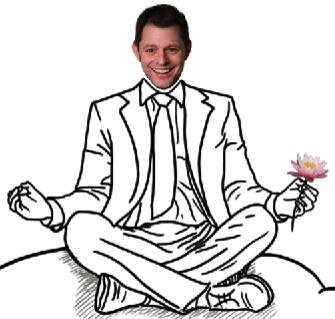I’m a talent and literary manager. Recently, a problem
was brought to my attention regarding an upcoming release. So we all got on the
phone–movie studio executives, publicists, agents, and myself–to discuss the
situation and see if we could find some resolution.
Going in, there was considerable tension; the call was
arranged by us representatives, and all the emails flying around had a real “us
vs. them” tone. We had our point of
view, which was clearly right; they
were crazy for thinking otherwise. The potential was there for
some real conflict. And I was as “right” as anyone else on the call, completely
sure that my point of view was as correct and unchangeable as anything I’d ever
considered.
Fortunately, I had a few things going for me:
- I’ve been
slowly increasing my time on the cushion in preparation for the InterDependence
Project’s upcoming 24 Hour
Meditation Marathon. (By the way, now’s as good a time as any to sponsor me.) - I went to
see Thich Nhat Hanh at the Beacon Theater on Friday night, and the phrase
“Peace is Every Step” was still rattling around in my skull. - My “Peace
is Every Step” calligraphy
had just arrived at the office and was staring back at me from the
windowsill. Way to go, Spiritual Materialism! - I went to a
great class on communication over the weekend where we were drilled over
and over on this amazing, unique, and rare skill called listening.
So as the “other side” started stating their case, I was
just a little surprised that I was able to notice my inclination to resist
hearing what they had to say, and simply listen. It instantly occurred to me that the people presenting the ideas to
us were not the “enemy,” but in fact, were trying to do something positive for
the film and for my client. And while our priorities were not exactly they
same, they were necessarily interdependent. Because of this, I was able to
guide my “side” to being willing to hear the proposal, and to consider it
without prejudice. As they said in class this weekend, we became “willing to
want to,” open to the idea that their request was something we might agree to.
We walked away from the call feeling energized and collaborative, and I know
that the client will be better off for it.
This lesson isn’t anything new; the Buddha taught it from at
the start. Thich Nhat Hanh tells
us that in order to have Right Speech , we must practice deep listening:
“Deep listening is at the foundation of Right Speech. If we
cannot listen mindfully, we cannot practice Right Speech. No matter what we
say, it will not be mindful, because we’ll be speaking only our own ideas and
not in response to the other person.”
And because we were able to listen, we were able to consider
an alternative to our predetermined point of view. Geshe Michael Roach teaches
of the “emptiness of problems” in his book The
Diamond Cutter:
“An object becomes good or bad according to your perceptions, and these
perceptions are dictated very precisely by the good or bad imprints you put in
your mind in the past. Problems are not problems from their own side;
rather, there is something in your mind making you see the problem as a
problem. Every problem can be
turned into an opportunity, because no problem is a problem in and of itself.”
We often assume
that the best solution to problems in the business world is one that benefits
us the most, in the short term. Clearly, this hasn’t worked out so well; greed
has led the economy to a near-disaster, we’re choking on the poisons we’ve
spewed into the air, earth, and water, almost eleven million children die each
year of preventible
causes, and wars
rage on several continents.
Fortunately, the
Buddha provided teachings to guide us in our livelihood. Right Livelihood seems
like an antiquated concept, and it doesn’t help that the few no-no’s provided
by the sutras include arms-dealing, the slave trade, and fortune-telling. But
it’s possible to make a living in a way that benefits others and cares for the
earth, and the lessons we take from the teachings can actually allow us to be
more successful in our careers without being solely focused on numero uno.
As Thich Nhat Hanh
said, “Buddhism is the strongest form of humanism we have. It can help us to
live with responsibility, compassion, and loving kindness.” There are so many
lessons in the teachings that can help us to have extraordinary careers, full
of joy and peace and compassion, to help make the world a better place. Many of
us spend more than half our waking hours at work, so naturally, having
happiness in our workplace will help create happiness in our lives. I’ll be
back each week to talk about the many lessons the Buddha provided in this area,
and I look forward to hearing your thoughts and experiences.

